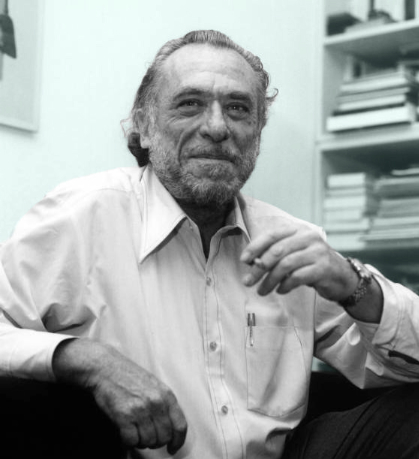
Here, Bukowski writes to friend and author John William Corrington with his trademark tall and luminous complaints. The subjects today are his health (ever-ailing), another poet (ever-brown-nosing) and the shortcomings of criticism when it comes to reviewing ‘the greats.’
This is a short one. I am on a tear, ill and shaky; no complaints, I guess it’s something I must burn out of my system, and if I make it, I make it. I don’t want to short-circuit you but your last letter shed more light than a powerhouse. That sentence makes me sick. You see how easy it is to roll off a log and just say something? I hate to do you a disservice with an ill description…I only repeat, I can barely see out of the front of my eyes this morning.
There was another one who wrote me for a while. But about what? New listings of magazines, about how he met an editor on the street. This guy lives with editors, sleeps with them, goes to the parties, snudges his nose up all the blind spots—and in a manner, for him, it pays off. He makes a lot of pages and his poems are full of words like STAR SEA NIGHT DEATH LOVE WOUND and you name the rest. What his name is doesn’t matter and you can multiply him by the hairs of grass that look so sickly up at me from my 3rd floor rented window. I had to sock him down in a poem to stop him from nibbling the eternal edge of my guts.
Cummings, yes, sometimes. His weakness is that he has devised a form that is easy to fall into. What I mean is that he can say almost anything or nothing and run it through his form and he has a lot of people believing it. This is Cummings, they say, the way they say, this is a Van Gogh, and all critical faculties fall lax because they have been pre-sold. People are pretty hard to sell, but once they believe, they believe and you cannot make them say no with a hammer. That’s not good. Cummings must be made to produce every time he sits down, and not merely sign his name. For Whom the Bell Tolls is one of the poorest novels ever written but nobody knows it because Hem wrote it. Nobody knows but another writer who is close enough to smell it. Nobody knows that a smaller work like To Have and Have Not was really art. And I don’t like the word “art.” How they sound on words and drivel on them and drive us away from them. I had a wife once who divorced me because more in essence than reality I would never say I loved her. How could I say this without dragging in Hollywood and my next door neighbor and patriotism and the barber’s cough and the cat’s ass?
Really, Bill, I am sick this morning. Must stop.
From Charles Bukowski: Living on Luck: Selected Letters 1960s-1970s, Volume 2. Bukowski, Charles, and Seamus Cooney. Santa Rosa: Black Sparrow Press, 1995.


